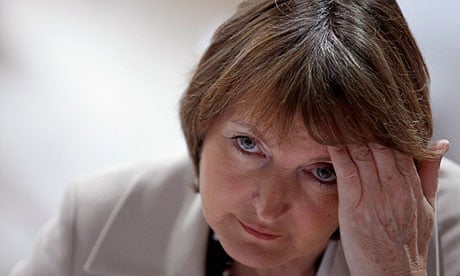At last night's election hustings, big-hitters from all three parties addressed black voters directly, in an event which could have a strong impact on their votes.
This is an election where the minority population is concentrated in many marginal seats, so in a tight race it could potentially play a pivotal role in the outcome. That probably explains why Harriet Harman, George Osborne and Vince Cable accepted the invite to address the 1,500-strong audience. And many in the room may well have switched their allegiance.
First up was Harman. She should have been preceded by a video message from Gordon Brown; but in Labour's first direct collateral damage from the Gillian Duffy affair, he was rushing back to Rochdale to apologise to the pensioner at the time he'd been scheduled to make the recording.
And things got worse with her opening line: "Good evening, brothers and sisters." The audience fell about in a mixture of laughter, anger and disbelief. Why is she addressing us like some 1980s community activist when we know the feeble record of her, and her government, over the last 13 years, they asked themselves?
Harman is the minister for equalities, as well as having five other government and party jobs. Previous to this, I'd been to three different race-equality events where she'd been booked to speak, but hadn't shown up and had sent a minion in her place.
Perhaps if she had shown a bit more interest in race over the years, she might not have made such a fool of herself.
In an effort to patronise her audience even more, she went on: "We work together as a team – black, white, Asian people together." Err … Harriet, how many black and Asian people are there in cabinet. Here's a clue: it's less than one.
She raised a cheer when she made the valid point that only Labour governments had ever passed race equality laws. But she had little to say apart from: "We are opposed to prejudice," and when the issue of the DNA database came up, she was roundly booed. From the start, she had come across as someone regurgitating a years'-old speech, with no consideration whatsoever for her audience.
Despite a video message from David Cameron, they booed George Osborne's entrance, too. Maybe the shadow chancellor had just come along so that, like his boss, he can now tell his friends he's met a black man.
And the dissent grew when he began his speech by talking about Martin Luther King; Barack Obama; and 1950s Britain. Jeers were coming from across the hall. But as he moved on to modern Britain, the audience began to listen, particularly when he spelled out his specific plans: "I'm going to give you support and advice to start your own business." And, to redress inequality in the civil service: "I'm going to introduce internships in every Whitehall department for ethnic minorities." They may be minor measures, but he'd obviously given the occasion some thought.
On stop and search, after saying that police anti-terror powers had been "completely abused" and "had been a complete disgrace in this country", he got his first widescale applause. And after saying he'd scrap the keeping of DNA records for innocent people (which affects huge and disproportionate numbers of young black men) he left the hall to loud cheers.
After a recorded message from Nick Clegg, in which he railed against stop and search, the DNA database and 28-day detention powers, Vince Cable was given the warmest reception of the three. He immediately tackled head-on his party's failures on race and its lack of black and Asian MPs, offering a personal apology.
And he went on to reveal even more of his human side. "My father was, what you might call, a white supremacist," he said, recalling the prevailing attitudes of postwar Britain. And when Cable married an Asian woman in the 1960s, it "tore my family apart". As the audience knew, in that era it took real courage to have a relationship with someone from another race. But over the decades the relationship with his father mended. In Britain, Cable said: "Now there's a growing acceptance that we're a better country for being diverse. Yes, we still have problems, but my background gives me a sense of hope that we can deal with these problems." With this, Obama-style moment, he had the audience in the palm of his hands.
Many audience members told me afterwards they felt like switching to the Lib Dems – either from Labour or from planned abstentions. Colourful Radio presenter Henry Bonsu, who I was sat next to, says that feedback from his listeners also suggests that the party's lack of black candidates won't necessarily hurt them: "Even though black people are aware of this they like the idea that Nick Clegg upset the apple cart. Their experience of the last 20 years is that black MPs can become prisoners of the party machine; but people look at Clegg and think a lot of other things might change."
We'll see. But if one night showed that Labour is taking black support for granted, and that the other parties are hungry for their votes, then this was it.

